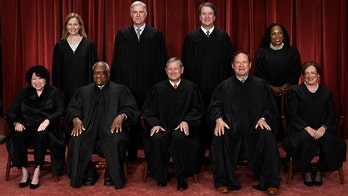The White House has no imminent release date for the expected Pentagon report on where to relocate Guantanamo Bay detainees on American soil if it closes the U.S. military prison there.
The report, on the pros and cons of four U.S. prison facilities in three states, was expected to be released last week.
However, White House Press Secretary Josh Earnest said Friday that the plan, which President Obama will present to Congress, “will come relatively soon.”
“I can’t give you a more specific timing update,” he told reporters.
The facilities being reviewed by the Pentagon are the U.S. Disciplinary Barracks and Midwest Joint Regional Corrections Facility at Leavenworth, Kansas; the Consolidated Naval Brig, Charleston, South Carolina; the Federal Correctional Complex, which includes the medium, maximum and supermax facilities in Florence, Colorado; and the Colorado State Penitentiary II in Canon City, Colorado.
“We’re looking to have (the report) potentially soon,” Pentagon spokesman Cmdr. Gary Ross said Friday, according to the news website DefenseOne.com, but “nothingimminent.”
The Guantanamo facility was opened in the wake of the Sept. 11, 2001 terror attacks as an expedient move to get suspected terrorists off the battlefield.
Obama has vowed since his 2008 presidential campaign to close the facility, at the U.S. naval base in Guantanamo Bay, Cuba. He argues that keeping the 112 detainees remaining in the facility -- including some who have never had a trial -- is unjust and expensive.
However, his efforts have been repeatedly thwarted on Capitol Hill, particularly by Republicans who argue that bringing known terrorists onto American soil for trials and prison stays is too much of a national security risk.
Congress, in fact, passed a $607 billion, bipartisan defense policy bill last week that bans moving detainees to the United States -- a move similar to ones in recent years.
And the pending Pentagon report is being perceived as another sign that the president intends to close Guantanamo by executive order before he leaves office in January 2016.
Earnest has indicated twice in recent weeks that Obama might use executive action to get around Congress.
“I'm going to protect the ability of the president to use his authority that moves the country in the direction that he believes it should be headed, and particularly when it comes to an issue like … closing the prison at Guantanamo Bay,” Earnest said after the Senate vote.
The president would likely use executive authority to side-step Congress instead of trying to veto the Defense bill, considering the 91-to-3 Senate vote and a 370-58 House vote on its version of the legislation indicates Congress has enough support for a veto override.
In recent years, including fiscal 2014, Obama signed the bill but with a statement objecting to similar Guantanamo restraints.
The Associated Press contributed to this report.




